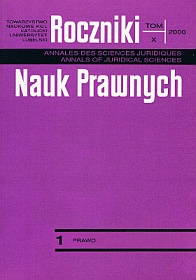Pojęcie i typy fundacji w prawie rzymskim
Abstrakt
The paper entitled "The Concept and Types of a Foundation in Roman Law" discusses in turn the ways of establishing and managing foundations in classical law (private foundations and alimentary foundations of the emperors) and in Justinian law (piae causae and goods to buy out slaves and to help the poor).
In order to consider the legal position of a foundation in Roman law it is necessary to make some reservations as regards the understanding of the term "foundation"; it is treated in a broad sense as a group of goods designed by the will of the founder for a concrete permanent goal.
Private foundations come mainly from the first and second centuries. They carried out, above all, religious (cult) goals, but also social (e.g. supporting poor children). In order to establish such a foundation one could take advantage of a donation or a legate supplemented by modus, on behalf of another existent institution. In classical law there were no independent foundations.
The inscriptions from Valeia and Ligures Baebini (from the times of emperor Trajan) provide us with information about the imperial alimentary foundations. The carried out at least two goals: they provided financial support for poor children and promoted the development of agriculture by giving profitable loans to land owners. It was, however, the emperor himself (or the Roman state as a private person) who was the owner of the foundational goods. Such foundations were not attributed with a private personality.
The situation of charitable foundations were widely regulated in Justinian law (in the Code and Novels) - piae causae (xenodochia, nosocomia, ptochotrophia and the like). The paper has discussed the ways in which to establish such foundations, as well as the rules which protect the decrees on behalf of charitable goals, management of the foundations, the relationships between the foundation and its administrator, and privileges granted to piae causae. The pre- vailing opinion is that such foundations should be granted a private personality. In that period we find also goods designed for buying out slaves and helping the poor. These were the properties unrelated with any institutions. Their standpoint is close to dependent foundations.
Copyright (c) 2000 Roczniki Nauk Prawnych

Utwór dostępny jest na licencji Creative Commons Uznanie autorstwa – Użycie niekomercyjne – Bez utworów zależnych 4.0 Międzynarodowe.


